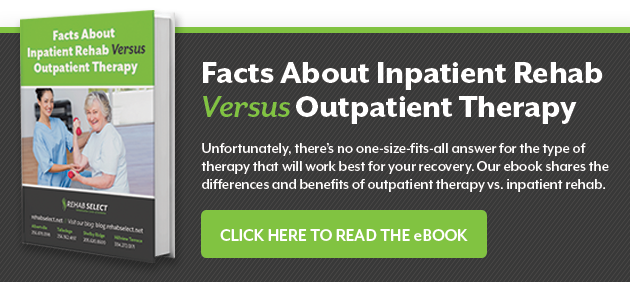
A recent study from the American Heart Association reported that nearly half of U.S. adults are living with some form of heart condition today, and as many as 6.9% have severe cardiovascular disease. If you are one of the many people suffering from severe chronic or acute heart disease, have recently experienced a heart attack, or have undergone heart surgery, your physician may recommend inpatient cardiac rehab.
In this article, we’ll break down what you can expect from your rehab program, how to choose between inpatient and outpatient treatment, and how you might benefit from cardiac rehab.
What is Inpatient Cardiac Rehab?
Cardiac rehabilitation is aimed at patients suffering from heart disease. The rehab program consists of progressive, monitored exercise, coupled with education on how to manage your heart disease and build a heart-healthy lifestyle. Most cardiac rehab programs will include an element of stress management or psychological support to help you deal with any issues with anxiety or stress that might impact your recovery.
Inpatient cardiac rehab is often the first stage of the rehab process. It may start immediately after heart surgery or another cardiac event. It is most commonly recommended to patients who have experienced a heart attack, heart failure, heart surgery, or serious cardiac diseases such as peripheral artery disease. Inpatient rehab may be available in a hospital, or at an acute rehabilitation facility. The rehab program will be designed and managed by a multidisciplinary team of medical specialists, including physical therapists, occupational therapists, dietitians, psychologists, doctors, nurses, and respiratory therapists.
The inpatient rehab program will be customized to suit your unique needs and limitations, but will usually include:
- A supervised, gentle exercise program
- Nutritional counseling
- Educational programs and workshops
- Physical therapy
- Guidance on the use of medication and assistive devices
- Psychotherapy
- Smoking cessation treatment
- Occupational therapy
When is Inpatient Cardiac Rehabilitation Advisable?
Deciding whether to undergo cardiac rehab as an inpatient or an outpatient depends on several factors. Here are a few of the most critical issues to consider:
1. Patient Safety
When weighing up whether you or your loved one should pursue inpatient or outpatient treatment, the most important consideration is, of course, the safety and well-being of the patient. After major heart surgery or a heart attack, there may be a need for the patient to be closely supervised. Under those circumstances, inpatient cardiac care is preferable. The patient will be surrounded by medical specialists at all times in case of any recurrence of symptoms or the need for urgent medical assistance.
2. Faster Recovery
Inpatient rehab programs can be more comprehensive. In an inpatient facility, the rehab team work together to design a customized treatment program and will be easily able to keep an eye on your progress and modify your rehab treatment accordingly. You will also have more frequent treatment sessions and can focus exclusively on recovery without having to manage your daily responsibilities as you would at home. As a result, you are likely to make a faster recovery as an inpatient.
3. Availability of At Home Support
Recovering from a cardiac event or severe heart disease can be a long and challenging process. It may be that you do not have sufficient support available at home to help you manage as you return to daily life. In those cases, it may be advisable to consider inpatient care.
4. Insurance
Typically, insurance companies will only cover inpatient rehab if you can demonstrate the need for round-the-clock medical care. If you are recovering from a heart attack, major cardiac event, or recovering from heart surgery, you are likely to be eligible for inpatient rehabilitation, but you will need to discuss this with your insurance provider. If your medical documentation shows that a less intensive form of rehabilitation would be more appropriate for your needs, then outpatient rehab may be the only option available to you.
What are the Benefits of Inpatient Cardiac Rehab?
Inpatient cardiac rehab has been proven to have major benefits for cardiac patients, including:
1. A Longer Life and Lower Risk of Rehospitalization
The American College of Cardiologists reports that cardiac rehabilitation improves your chances of recovery from heart disease and makes it less likely that you will experience further heart problems in the future. Rehab also reduces your risk of ending up back in the hospital and lowers mortality rates.
2. Increased Physical Fitness and Mobility
Inpatient cardiac rehab enables you to return to daily activities, such as walking, housework, or climbing stairs, gently and safely. Your physical and occupational therapists will make sure that you follow a supervised exercise program that only progresses when you’re ready, ensuring that you increase your physical fitness, stamina, stability, and muscle strength without exacerbating your heart condition.
3. Better Understanding of a Heart-Healthy Lifestyle
All inpatient cardiac rehab programs include extensive counseling, training, and education on how to improve your lifestyle to support your recovery. As an inpatient, you’ll receive comprehensive training from a full team of rehab professionals on everything from diet to exercise to stress management. You’ll also have the time and space to make the changes you need to make, such as quitting smoking, before you return to the stresses of daily life.
4. A Better Quality of Life
According to the CDC, cardiac rehab has been proven to increase patient’s “functional status” (i.e., how easily they can perform daily tasks and activities), as well as boosting their quality of life, mood, and medication adherence. As an inpatient, you’ll have 24-hour access to a team of rehab professionals while you recover. They will be able to reassure you about your condition, support your recovery, and help you to manage any resulting anxiety or depression. Inpatient cardiac rehab provides a nurturing environment in which to adjust psychologically to your condition as well as manage and reduce your symptoms. As a result, you’re likely to feel better emotionally, as well as physically.
5. Guidance on Returning to Daily Life
If you’ve experienced a heart attack or other serious cardiac event, it may be challenging to return to your everyday routine, and particularly head back to work. During inpatient rehab, your rehab team can help guide you through any changes you should make at your workplace or in the home, advise on modifications you might need to your job or environment, and help you prepare physically and mentally for the realities of daily life.
If you’d like to learn more about the inpatient cardiac rehab programs available at Rehab Select’s facilities, please visit our website, or click here to contact us.





